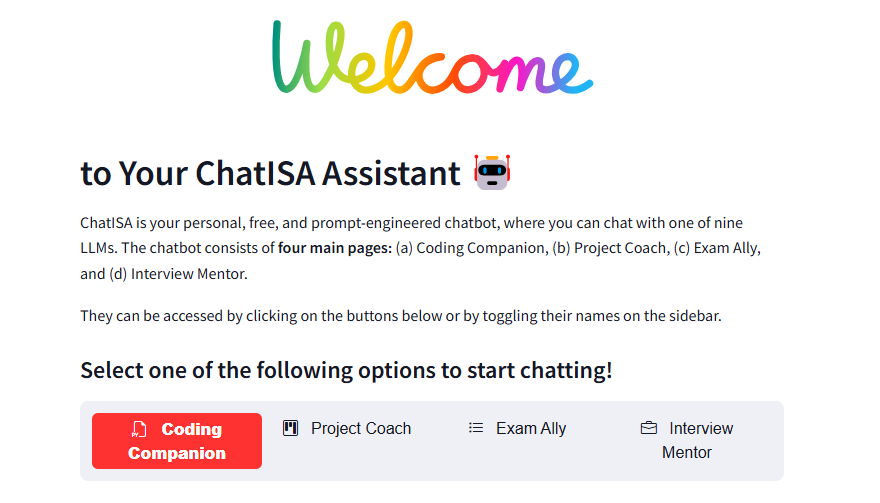AI-powered ChatISA upgrades technology, adds features for students
Updates add three new features to chatbot designed to help students

AI-powered ChatISA upgrades technology, adds features for students
An AI chatbot created by an Information Systems and Analytics professor in 2023 to help students learn computer coding has been upgraded and expanded.
Fadel Megahed’s ChatISA originally had an emphasis on providing coding examples in R and Python, and responses were tailored toward Business Analytics students. “We didn't want students who could afford to pay for AI and students who couldn't afford to pay for AI to have some discrepancies if the courses allow for AI usage,” he said. “So we created this bot that had some prompt engineering in the back end that essentially allowed students to generate code that would meet the way we teach them how to code.”
Now Megahed, with help from Joshua Ferris, has added three new modules to ChatISA: Project Coach, Exam Ally, and Interview Mentor.
Watch: Explaining the updates to ChatISA
“Project Coach primarily focuses on helping students work with their teammates during projects. There are several engineered prompts that would walk a team through different scenarios,” Megahed said. “If they need a devil's advocate, for example, they can tell the bot, ‘Here's our idea,’ and it would help generate some scenarios that would expand the horizons about how they're tackling the project.”
“As we came closer to the final exam period, we thought it might be a good idea to also help them prepare for exams. So, we created an Exam Ally, to which a student can upload a PDF document of their class notes, or a portion of their class notes, and they can ask the AI to generate some questions based on these notes,” he said.
“Using the same technology from Exam Ally, we created something that would help students prepare for interviews. A student can upload a PDF of their resume, and they can cut and paste in the job description and job title, and they can give the AI a little bit of feel for how complex the interview needs to be,” Megahed said. “Then the AI will ask students a combination of technical and situational questions that are tailored to the interview. So, for example, if they know that they're applying for a data visualization specialist, it can ask some specific questions about data visualization.”
While adding the new features, ChatISA has been continually updated to use the latest AI models available to power them. “We have Sonnet 3.7 as the default model for the coding companion, because it's currently the state of the art for that kind of code generation. And then we have the GPT-4o model for some of the conversational pieces, because we've seen that it worked really well,” Megahed said. Students can choose different AI models to see a variety of outputs to their questions.
While initially aimed at Business Analytics students, parts of ChatISA can now assist students in many majors. “I've done some testing with FSB Careers where we had STEM students explore this new feature, and it seemed to be working pretty well,” Megahed said.
Another goal for the project is to get students working more closely with AI for their own experience and enlightenment, he said. “The idea is how do we work with AI and prepare students where AI is part of the future. There was a recent report by the World Economic Forum which found more than 70 percent of employers would be willing to hire a person with AI skills who's not very experienced over somebody who's more experienced but doesn't have AI skills.”
Megahed said working with an AI isn’t foolproof, but learning to recognize bad information is a valuable tool. “I tell the students that part of their experience is to figure out the signal from the noise, understanding that some of the AI answers might not be good, but it can give you a different perspective,” he said. “It can allow students to quickly iterate and focus, whether it's preparing for an exam or preparing for a job.”